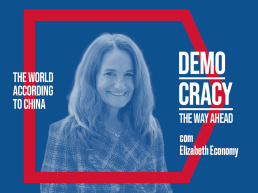The United States has built the largest economy in the world and are now, by far, the ones that provide the most important business references to the world, especially in the area of technology. But what makes the U.S., a country with less than a quarter of China’s population, the economic and business giant that still leads in innovation and trendsetting? Our guest this week is Sofia Tenreiro, Galp’s administrator, and with more than a decade of experience among some of the largest American multinationals.
From Procter & Gamble, to Cisco and Microsoft, Sofia Tenreiro has accumulated miles between some of the world’s largest companies. Her experience and know-how led her to the leadership of the American Chamber of Commerce in Portugal, between 2016 and 2019. Since then, Sofia Tenreiro has reached the management of Galp Energia, one of the largest companies in Portugal.
In conversation with Filipe Santos Costa, Sofia Tenreiro explains to us why American culture is so different and how differences in the way of thinking and acting, even in relation to the Western world, keep that country at the forefront not only in economic terms, but also in business terms.
“The U.S. certainly continues to have great competitive advantages, from the mindset of taking risks and being much more immediate. Asians think in centuries, Americans think in quarters. (…) From the perspective of innovation and entrepreneurship, no doubt this immediacy is very important, because we want quick results and we want to test quickly, to see if it works fast. And if it doesn’t work also to make sure that the flaw that’s going to exist is as fast as possible, so we can learn and get back on our feet again. And in that the U.S. is fantastic, because they look at error not as a failure, as Europeans look, but they look at error as an apprenticeship.” – Sofia Tenreiro
The manager looks to the future of the business world as a world where borders are increasingly fading, both for companies and workers, which allows for a company in Portugal to be able to compete beyond its market. What this brings of advantages, also brings additional pressure.
“Digitalization has begun to democratize both the market and talent. Nowadays thanks to all digital transformation any company can compete. It no longer competes for size or no longer competes for the size of the country where it is included. Any company in Portugal is not only related to the Portuguese market, if it has conditions and ambition it’s competing in the international market. We don’t have any more excuses altogether. And with talent also the same happens, thanks to digitalization nowadays it is possible to work anywhere in the world.” – Sofia Tenreiro
And what does this mean in a post-pandemic world, after a year in which many workers have been forced to work from home and in which some companies have already come to the conclusion that this may be the future?
“Nowadays it is assumed in all countries that working from home has come to stay. It became a necessity. A need in competitive and differentiation factor.” – Sofia Tenreiro.
Don’t miss this episode, already available on the platforms where you normally listen to your podcasts. You can also find this episode in the links below.
Related Posts
19 de April, 2024
‘The World According to China’ with Elizabeth Economy – May 9, at FLAD
One of the world's leading experts on…
19 de April, 2024
Alexandra Mendes and Jan Stockbruegger win Atlantic Security Award 2024
Professors from the University of Porto…
19 de April, 2024
NATO at 75: Challenges Ahead – the present and future of the Alliance under debate at FLAD
A war in Europe, two new members and…



